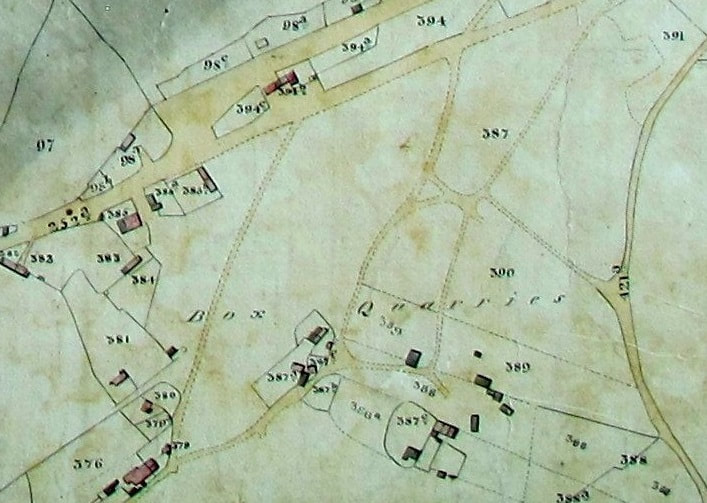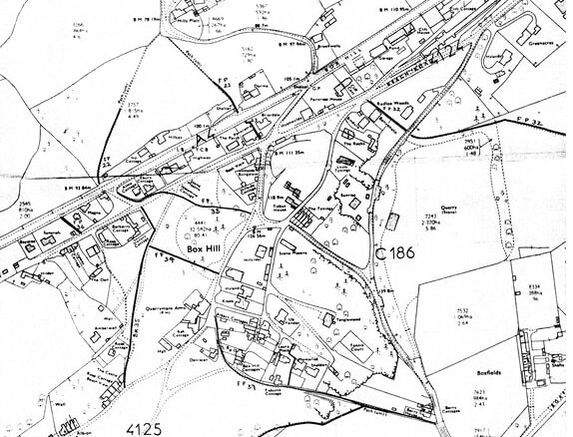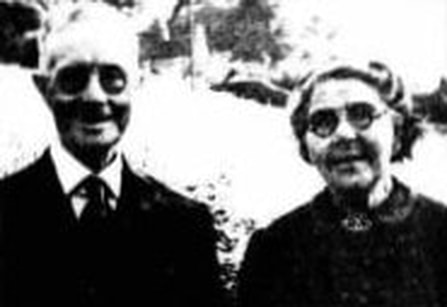Victory Cottage: First Battle of Box Hill Alan Payne July 2021
A house called Victory Cottage seems to recall a famous battle – perhaps Trafalgar, Waterloo, or Agincourt? But no, the battle recalled by Victory Cottage, Box Hill was more local than any of these. It dealt with the fundamental rights and freedoms of individuals in their locality, the age-old customs of ordinary people to exercise grazing rights against the power of money and ownership by the lord of the manor.
We don’t know when Victory Cottage was built or by whom. The 1840 Tithe Apportionment details confirm that Barberry Cottage existed, plot 383, but no property next-door, the site of Victory Cottage. For the record, Barberry Cottage was tenanted by John Neate from the estate of Peter Drewett and after 1890 was the home of Walter Reuben Oatley. It is probable that a property at Victory Cottage came after the development of the Clift Quarry tramway in the 1860s and was simply called Cottage, one of the many which were built for quarry workers, carved out of the edge of the area called Box Quarries.
The Early Cottage
Wilfred Barnett of Box Hill Cottages gave his view of the history of the area in 1932.[1] He said that the Northey family had sold various plots of land in 1925, describing them as common land, including this plot and others on Grove Farm and Box Hill Common. The Northeys sold the land to Mr Mogg of Sturminster Newton who later sold it to Mr Neate. Mr Mogg had earlier bought several plots in the Northey 1923 auction (probably acting as an agent) but this plot wasn’t included in that sale. Wilfred Barnett remembered that his grandfather used to bring a flock of sheep from Wadswick Farm to the Common to graze. Wilfred claimed that Mr Neate had removed his fowl-house, which had been there since 1919.
The Early Cottage
Wilfred Barnett of Box Hill Cottages gave his view of the history of the area in 1932.[1] He said that the Northey family had sold various plots of land in 1925, describing them as common land, including this plot and others on Grove Farm and Box Hill Common. The Northeys sold the land to Mr Mogg of Sturminster Newton who later sold it to Mr Neate. Mr Mogg had earlier bought several plots in the Northey 1923 auction (probably acting as an agent) but this plot wasn’t included in that sale. Wilfred Barnett remembered that his grandfather used to bring a flock of sheep from Wadswick Farm to the Common to graze. Wilfred claimed that Mr Neate had removed his fowl-house, which had been there since 1919.
Harry and Annie Field
Harry and Sarah Annie Field were newcomers to Box Hill who moved into the cottage in the late 1920s. Harry wasn't a quarryman or stone contractor. He was a distinguished gardener who worked for various large estates in the area including Charles Morley at Shockerwick.
Harry was born on 11 December 1875 in Colerne and married Sarah Annie Mattey on 6 August 1900 when Harry was a carter on a farm. They were a devoted couple who never had children. They moved to Motcombe Farm, Marshfield in 1911 where Harry was still working as a farm labourer but wanted more in life. He could have been exempted from serving in the First World War but instead volunteered for the Labour Corps and the Royal Engineers.[2] Military service was in his blood; his father had served in the Crimean War and, incidentally, Harry later worked for RAF Rudloe Manor and Royal Arthur. He had started work for his uncle’s plant nursery before the First World War and became an accomplished gardener. He also seems to have had a spirit of adventure, being one of the earliest residents on Box Hill to have a motor car, for which he was fined 10s in 1929 for failing to have proper lights showing.[3]
Battle of Box Common
It was Harry and Annie who renamed the Cottage as Victory Cottage in the 1930s. Possibly their main claim to fame was the battle that they and others fought to preserve commoners' rights on Box Hill in the years 1927 to 1932. The newspaper report of 1932 spent several columns of text debating the issues.[4] The commoners’ group claimed that the land had never been fenced, the deeds of some houses had commoners’ rights written into them and the council had itself quarried stone from the land for road maintenance. Against this, Frederick George Neate of Hillcrest, Box Hill claimed that quarrying had distorted the use of the land, he had bought the area as part of Grove Farm from the Northey estate and the tenant holders had not sought to enforce their supposed rights at that point, which accordingly lapsed. He disputed that the area was common land upon which the public had all rights of access.
Harry and Annie Field and Wilfred Barnett were taking on an enormous task in challenging the rights of Frederick George Neate. He was a person of consequence on Box Hill, an influential member of the United Methodist Church where he ran the Sunday School for 56 years.[5] He was also a person of particular views, a Rechabite, who refused to drink alcohol and was a Conscientious Objector in the First World War.
Harry and Sarah Annie Field were newcomers to Box Hill who moved into the cottage in the late 1920s. Harry wasn't a quarryman or stone contractor. He was a distinguished gardener who worked for various large estates in the area including Charles Morley at Shockerwick.
Harry was born on 11 December 1875 in Colerne and married Sarah Annie Mattey on 6 August 1900 when Harry was a carter on a farm. They were a devoted couple who never had children. They moved to Motcombe Farm, Marshfield in 1911 where Harry was still working as a farm labourer but wanted more in life. He could have been exempted from serving in the First World War but instead volunteered for the Labour Corps and the Royal Engineers.[2] Military service was in his blood; his father had served in the Crimean War and, incidentally, Harry later worked for RAF Rudloe Manor and Royal Arthur. He had started work for his uncle’s plant nursery before the First World War and became an accomplished gardener. He also seems to have had a spirit of adventure, being one of the earliest residents on Box Hill to have a motor car, for which he was fined 10s in 1929 for failing to have proper lights showing.[3]
Battle of Box Common
It was Harry and Annie who renamed the Cottage as Victory Cottage in the 1930s. Possibly their main claim to fame was the battle that they and others fought to preserve commoners' rights on Box Hill in the years 1927 to 1932. The newspaper report of 1932 spent several columns of text debating the issues.[4] The commoners’ group claimed that the land had never been fenced, the deeds of some houses had commoners’ rights written into them and the council had itself quarried stone from the land for road maintenance. Against this, Frederick George Neate of Hillcrest, Box Hill claimed that quarrying had distorted the use of the land, he had bought the area as part of Grove Farm from the Northey estate and the tenant holders had not sought to enforce their supposed rights at that point, which accordingly lapsed. He disputed that the area was common land upon which the public had all rights of access.
Harry and Annie Field and Wilfred Barnett were taking on an enormous task in challenging the rights of Frederick George Neate. He was a person of consequence on Box Hill, an influential member of the United Methodist Church where he ran the Sunday School for 56 years.[5] He was also a person of particular views, a Rechabite, who refused to drink alcohol and was a Conscientious Objector in the First World War.
|
Against the power of property ownership, Harry and Annie Field were keen Conservatives who knew their rights and stuck to them. They succeeded in gaining a partial success
and celebrated this by renaming their house Victory Cottage.[6] They may have thought that was the end of the matter but the issues recurred again in 1978. Annie died in 1950 shortly after their Golden Wedding and, on Harry's death on 28 February 1953, the cottage was put up for auction described simply as detached stone-built cottage with slate roof.[7] It had never been modernised and comprised sitting room with hob grate, pantry cupboard, double bedroom and landing bedroom, washhouse with boiler coal house and bucket closet (outside). |
Conclusion
It seems rather suitable that Bill and Margaret Woodland bought Victory Cottage in the 1960s. They also championed the role of ordinary people in Box: preaching at the Box Methodist Church, supporting the early years of Box Revels and helping at Box School. In 1973 Margaret chaired a fascinating Any Questions session in Box.[8] She faced some near-impossible questions: How to make the village centre more attractive? and Is this a man’s world? It might have been easier to sort out the rights on Box Hill Common.
It seems rather suitable that Bill and Margaret Woodland bought Victory Cottage in the 1960s. They also championed the role of ordinary people in Box: preaching at the Box Methodist Church, supporting the early years of Box Revels and helping at Box School. In 1973 Margaret chaired a fascinating Any Questions session in Box.[8] She faced some near-impossible questions: How to make the village centre more attractive? and Is this a man’s world? It might have been easier to sort out the rights on Box Hill Common.
References
[1] The Wiltshire Times, 23 July 1932
[2] Wiltshire Times and Trowbridge Advertiser, 12 August 1950
[3] Wiltshire Times and Trowbridge Advertiser, 19 October 1929
[4] The Wiltshire Times, 23 July 1932
[5] Somerset Guardian and Radstock Observer, 2 April 1953
[6] The Wiltshire Times, 7 March 1953
[7] The Wiltshire Times, 25 April 1953
[8] Parish Magazine, July 1973
[1] The Wiltshire Times, 23 July 1932
[2] Wiltshire Times and Trowbridge Advertiser, 12 August 1950
[3] Wiltshire Times and Trowbridge Advertiser, 19 October 1929
[4] The Wiltshire Times, 23 July 1932
[5] Somerset Guardian and Radstock Observer, 2 April 1953
[6] The Wiltshire Times, 7 March 1953
[7] The Wiltshire Times, 25 April 1953
[8] Parish Magazine, July 1973


